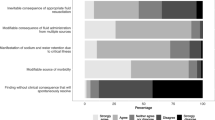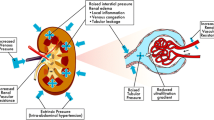Abstract
Hypokalemia (mean serum potassium 2.3±0.4 mEq/l) was observed in six hypothermic patients (30°–32°C) with head injuries or brain hypoxia. In the first three patients, potassium was administered to maintain serum levels above 3.5 mEq/l and on rewarming after 48 h of hypothermia hyperkalemia (peak serum potassium=7.1±0.5 mEq/l) associated with cardiac arrhythmias developed. The remaining three patients received sufficient potassium to approximately replace measured losses during the hypothermic period. These patients did not become hyperkalemic on rewarming. Clinically insignificant sinus bradycardia, premature arrial contractions and junctional rhythms were seen during hypothermia with hypokalemia. We conclude that hypothermia produces hypokalemia by a shift of potassium from the extracellular to intracellular or extra vascular spaces. Potassium therapy during controlled hypothermia in the range 30°–32°C should only replace measured losses.
Similar content being viewed by others
References
Asami S (1975) Studies on electrolyte metabolism in serum and tissues during extracorporcal circulation and the surface cooling. Jpn J Thorac Surg 23:191
Black PR, Van Devanter S, Cohn LH (1976) Effects of hypothermia on systemic and organ system metabolism and function. J Surg Res 20:49
Chinard FP (1978) Accidental hypothermia — a brief review. J Med Soc NJ 75:610
Coniam SW (1979) Accidental hypothermia. Anaesthesia 34:250
Machida S, Ohta S, Itoh N (1977) Changes in tissue distribution of potassium during simple hypothermia. Jpn J Thorac Surg 30:413
O'Keefee KM (1977) Accidental hypothermia: A review of 62 cases. JACEP 6:491
Shida H, Morimoto M, Seki T, Inokawa K (1975) Metabolic changes in surface — induced deep hypothermia combined with cardiopulmonary bypass for cardiac surgery. Jpn J Surg 5:73
Shida H, Morimoto M, Sugenoya H, Seki T, Inokawa K (1973) Changes of serum electrolytes at open heart surgery with simple profound hypothermia: relation between transient hypopotassemia and metabolic acidosis. Jpn J Thorac Surg 26:723
Todd EP, Campbell HC, Utley JR, Miller RE, McAllister RG Jr, Wachtel CC, Collins JC, Erickson JL (1977) Effect of betaadrenergic blockade on hypothermia-induced hypokalemia. Surg Forum 28:275
Author information
Authors and Affiliations
Rights and permissions
About this article
Cite this article
Koht, A., Cane, R. & Cerullo, L.J. Serum potassium levels during prolonged hypothermia. Intensive Care Med 9, 275–277 (1983). https://doi.org/10.1007/BF01691254
Accepted:
Issue Date:
DOI: https://doi.org/10.1007/BF01691254




